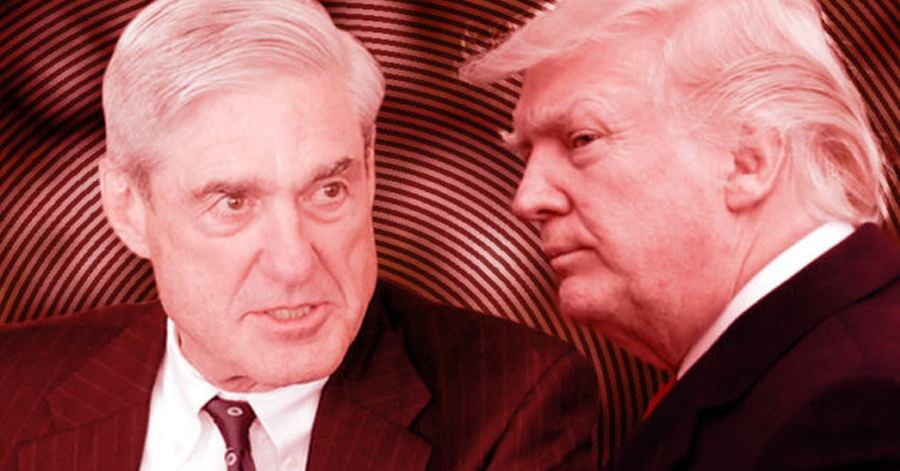Special Counsel Robert Mueller is attempting to use what the FBI found during the collusion investigation to frame Trump for obstruction. He is attempting to get the right people under his thumb, people that will say what he needs them to say to cast a shadow on Trump.
Even though the collusion probe is done, Mueller will be able to use “counterintelligence” to as an excuse to continue this informal investigation.
National Review gives an in depth legal analysis that exposes what exactly is going on.
Mueller is methodically constructing a major case on Trump by accepting minor guilty pleas from Michael Flynn and George Papadopoulos for making false statements, and by indicting Paul Manafort and an associate on charges that have nothing to do with Trump or the 2016 election.
That means it is, as it has always been, an impeachment investigation.As I’ve tried to explain a few times now (see here and here), if a prosecutor has an accomplice cooperator who gives the government incriminating information about the major scheme under investigation, he pressures the accomplice to plead guilty to the major scheme, not to an ancillary process crime — and particularly not to false-statements charges. Strategically, and for public-relations purposes (which are not inconsequential in a high-profile corruption investigation, just ask Ken Starr), a guilty plea to the major scheme under investigation proves that the major scheme really happened — here, some kind of criminal collusion (i.e., conspiracy) in Russia’s espionage operation against the 2016 election. The guilty-plea allocution, in which the accomplice explains to the court what he and others did to carry out the scheme, puts enormous pressure on other accomplices to come forward and cooperate. In a political corruption case, it can drive public officials out of office.
If the FBI had a collusion case of some kind, after well over a year of intensive investigation, Flynn and Papadopoulos would have been pressured to plead guilty to very serious charges — and those serious offenses would be reflected in the charges lodged against Manafort. Obviously, the pleas and the indictment have nothing to do with collusion because Mueller has no collusion case. It’s Now an Obstruction Investigation .Since there is no collusion case, we can safely assume Mueller is primarily scrutinizing President Trump with an eye toward making a case of obstructing an FBI investigation.
his also makes sense in light of the pleas that have been taken. Obstruction itself is a process crime — i.e., it relates to interference in the investigation of an underlying transaction that may or may not be criminal. In the first point, above, we noted that prosecutors generally do not let a cooperator settle a case by pleading guilty to a mere process crime. But if the main case the prosecutor is trying to build is itself a process crime, such as obstruction, then it is not all that damaging that the witnesses have pled guilty only to process crimes. The theme of such a prosecution is that the investigative process must be protected, not that some terrible underlying crime (like an espionage conspiracy) has been committed.
Witnesses such as Flynn and Papadopoulos would therefore not be made to look like they had gotten a pass on serious offenses; they would look like they had owned up to corrupting the process and are now helping the prosecutor against the principal corruption target. Mueller’s theory appears to be straightforward: The FBI was investigating Russian meddling in the election and the possibility of Trump-campaign complicity in it. Even though Flynn’s interactions with Russian ambassador Sergei Kislyak did not amount to Trump-campaign collusion in Russia’s perfidy, they did show that the Trump transition was dabbling in foreign relations with the Putin regime (among other foreign governments) and was attempting to undermine the policy of the incumbent Obama administration — at least on the U.N. resolution condemning Israel. (On the sanctions Obama had imposed on Russia, Flynn made no commitments and encouraged his Russian counterpart not to escalate matters in retaliation, which, if anything, was supportive of Obama’s policy.)
There is no way Mueller could actually get a conviction. Trump is certainly not going to jail as he was was well within its right to exercise prosecutorial discretion and to fire the FBI director. Still even if it is not a convictible offense. there could still be grounds for impeachment. They would try to say the executive powers were abused.
Congress retains the constitutional authority to impeach and remove the president. Obstruction of an FBI investigation may not be realistically prosecutable in court, but there is congressional precedent — in the Nixon and Clinton situations — for obstruction to be a “high crime and misdemeanor” triggering impeachment.
Undoubtedly, abuse of the pardon power would also be an impeachable offense, even though it is not reviewable by the courts. I continue to believe that this is the real danger for President Trump: A report by the special counsel, either through the grand jury or some other vehicle, concluding (a) that the president had obstructed the FBI’s investigation of Flynn and of Trump-campaign collusion with Russia, and (b) recommending that the matter be referred to Congress for consideration of next steps, potentially including impeachment and removal.
Mueller seems have had this goal in mind from the get go, and everything else has been part of the conspiracy to cast doubt on Trump’s patriotism enough to warrant impeachment. He hopes to use other politicians self-serving interests against Trump, so they will turn on him as long as lets them be. Do you think he has any chance of making enough of a case to warrant impeachment?


